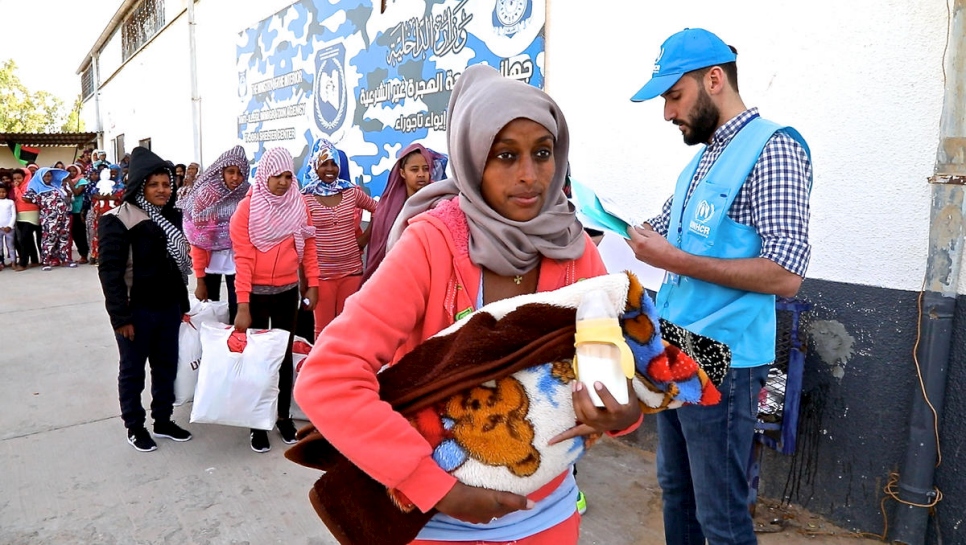Refugees take safety flight out of Libya
A charter carrying 132 refugees and asylum-seekers reaches Niger, resuming a life-saving evacuation programme after a two-month suspension.

Eritrean mother Eden and her baby son leave a detention centre in Libya, bound for an evacuation flight to Niger. © UNHCR
TRIPOLI, Libya – Pregnant and fearing for her life, Eden* crammed into a boat on the southern shores of the Mediterranean with hopes of reaching safety in Europe. But when the overcrowded vessel flipped offshore, the 25-year-old Eritrean found herself instead in detention in Libya.
Held for months in poor conditions in Misrata, she and her newborn baby boy were among 132 vulnerable refugees and asylum-seekers flown out of Tripoli to Niger today, after UNHCR, the UN Refugee Agency, resumed life-saving evacuation flights after a break of two months.
- Get the day’s top refugee stories delivered to your inbox. Subscribe to our daily newsletter.
"My only hope was to reach Europe so that my baby would see the light in a country where he could be protected and safe,” said Eden, as she fidgeted with her fingers at an airport in Tripoli, overcome by the many sensations she was living. “Today my prayers have been heard."
UNHCR began the emergency evacuations in November as part of a broader effort to address the complex movement of migrants and refugees along the Mediterranean routes, several of which converge in Libya.
"This programme is really about saving vulnerable individuals from further harm.”
Many refugees and asylum-seekers are detained in harsh conditions in Libya for long periods of time. At present, UNHCR estimates that there are 5,700 individuals held in official detention centres, of whom 2,637 are concern to UNHCR.
“Refugees in detention in Libya are languishing in extreme conditions that threaten their life and wellbeing,” said Vincent Cochetel, UNHCR’s Special Envoy for the Central Mediterranean Situation. “So this programme is really about saving vulnerable individuals from further harm.”
The flight, which departed Tripoli on Thursday morning, was the ninth since the evacuations began. The programme was suspended in March following concerns from the government of Niger that onward departures for resettlement in other countries were not keeping up with the pace of arrivals into Niger.

Eritrean refugee Simon, 38, waits at Tripoli airport for an evacuation flight to Niger after months in detention in Libya. © UNHCR/Photographer:Sufian Said
Aware of the difficult conditions that refugees are enduring in detention, authorities in Niamey generously agreed to the resumption of evacuations in May, offering additional spaces to host vulnerable refugees from Libya.
Along with Eden, 38-year-old Eritrean Simon also traveled to Niger. As a single man, he faced dangers en route to Libya including kidnap and forced labour. “Many detainees prayed for days to be part of UNHCR evacuations, as it's the only hope we have to be released," he said before boarding the flight. "Today I am lucky to have been selected and departing to Niger where I am confident many opportunities will arise."
There are currently some 605,226 persons of concern to UNHCR in Libya, including 184,612 internally displaced people, 368,583 returnees and 52,031 registered refugees and asylum-seekers.
"Many detainees prayed for days to be part of UNHCR evacuations."
For the flight to happen, UNHCR’s team in Libya had worked around the clock. A team visited different detention centres to register refugees, identifying the most vulnerable like Eden and Simon, and liaising with Libyan authorities to ensure that those selected for the flight had their exit permits ready to depart.
A logistics team meanwhile contracted the aircraft and arranged the refugees' transport from detention in Misrata, passing through several check points to reach Tripoli. Staff ensured blankets and other basic items such as clothing and shoes were also made available before travel.
This was the charter flight’s second attempt to fly refugees and asylum-seekers out of Libya. On Tuesday, the aircraft had to turn back to Tripoli after encountering technical problems. The passengers had to spend an additional night in detention.
After reaching Niger, Eden and the other evacuated refugees will get another shot at finding long-term solutions, this time in the conditions of safety that they were desperately looking for when they left their countries of origin.
On arrival in Niamey, UNHCR met the refugees, taking them to transit guesthouses or 'cases de passage.' While solutions, including resettlement, are sought for them, they will receive food, psychosocial support and medical care, and will be able to take part in recreational activities such as sports, language, art and music classes.
With the resumptions of the evacuations from Libya to Niger, UNHCR hopes that many more refugees will find safety and, like Eden and Simon, have a new chance at life.
*Refugees' names changed for protection reasons
(With additional reporting by Louise Donovan in Niamey, Niger)
